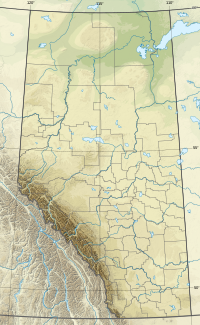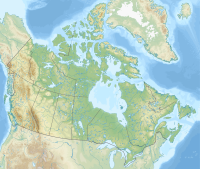Mount Galwey is a mountain located north of Blakiston Creek in Waterton Lakes National Park, Alberta, Canada. The mountain was named in 1934 after Lt. Galwey, who was an astronomer for the International Boundary Commission.[6]
| Mount Galwey | |
|---|---|
 | |
| Highest point | |
| Elevation | 2,377 m (7,799 ft)[1][2][3] |
| Prominence | 182 m (597 ft)[2] |
| Parent peak | Mount Dungarvan (2575 m)[2] |
| Listing | Mountains of Alberta |
| Coordinates | 49°07′23″N 113°56′47″W / 49.12306°N 113.94639°W[4] |
| Geography | |
| Location | Alberta, Canada |
| Parent range | Canadian Rockies |
| Topo map | NTS 82H4 Waterton Lakes[4] |
| Climbing | |
| Easiest route | Difficult Scramble[5] |
Geology
editLike other mountains in Waterton Lakes National Park, Mount Galwey is composed of sedimentary rock laid down during the Precambrian to Jurassic periods. Formed in shallow seas, this sedimentary rock was pushed east and over the top of younger Cretaceous period rock during the Laramide orogeny.[7]
Climate
editBased on the Köppen climate classification, Mount Galwey is located in a subarctic climate zone with cold, snowy winters, and mild summers.[8] Temperatures can drop below −20 °C with wind chill factors below −30 °C. Precipitation runoff from Mount Galwey drains into tributaries of the Waterton River.
See also
editReferences
edit- ^ "Topographic map of Mount Galwey". opentopomap.org. Retrieved 2022-05-23.
- ^ a b c "Mount Galwey". Bivouac.com. Retrieved 2013-09-09.
- ^ "Mount Galway". cdnrockiesdatabases.ca. Retrieved 2020-06-25.
- ^ a b "Mount Galwey". Geographical Names Data Base. Natural Resources Canada. Retrieved 2020-06-25.
- ^ Kane, Alan (2016). "Mount Galwey". Scrambles in the Canadian Rockies (3rd ed.). Calgary: Rocky Mountain Books. Kindle Edition. ISBN 978-1-77160-098-9.
- ^ Place-names of Alberta. Ottawa: Geographic Board of Canada. 1928. p. 56.
- ^ Gadd, Ben (2008), Geology of the Rocky Mountains and Columbias
- ^ Peel, M. C.; Finlayson, B. L.; McMahon, T. A. (2007). "Updated world map of the Köppen−Geiger climate classification". Hydrol. Earth Syst. Sci. 11: 1633–1644. ISSN 1027-5606.
External links
edit- National Park Service web site: Waterton Lakes National Park
- Mount Galwey photo: Flickr

